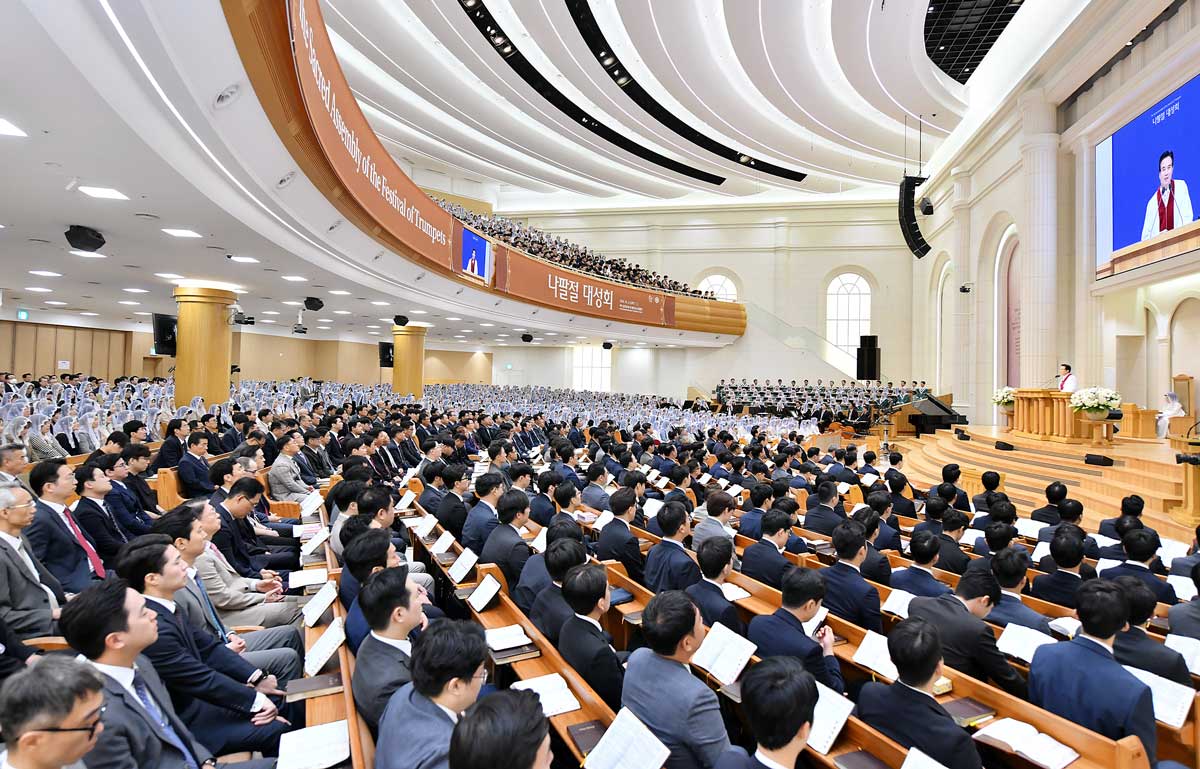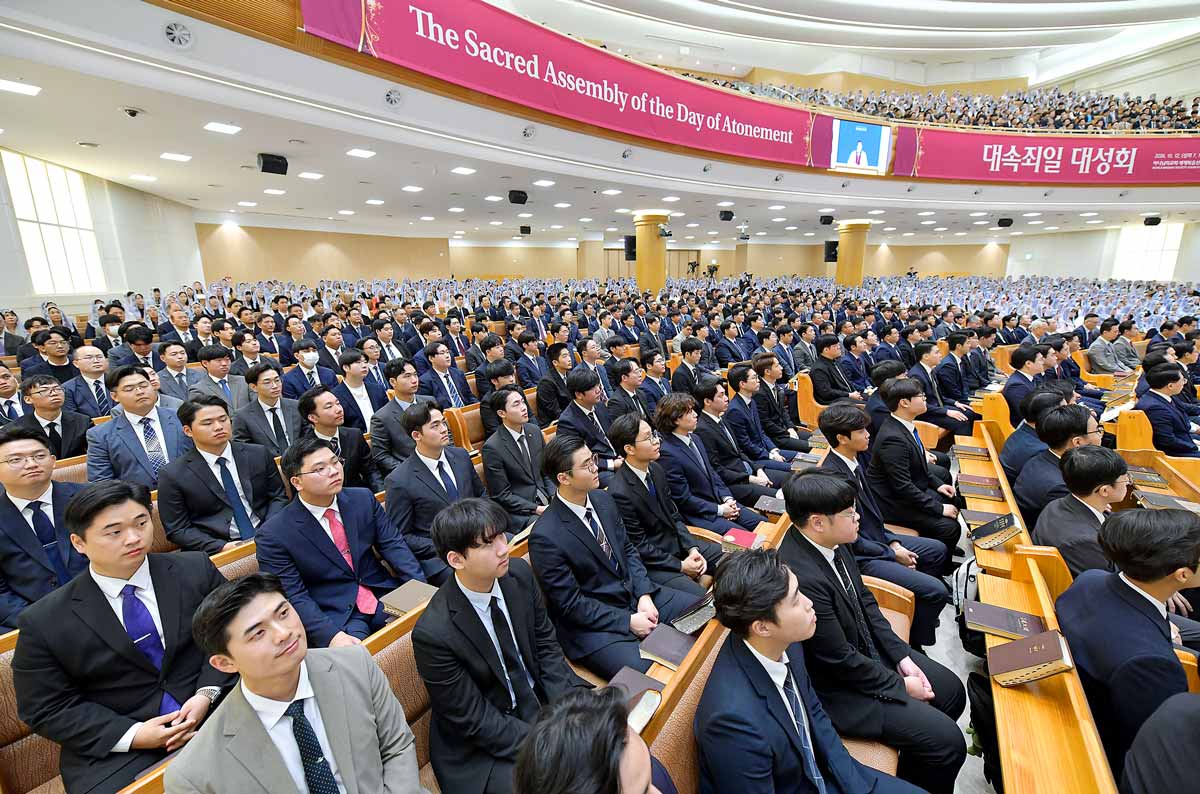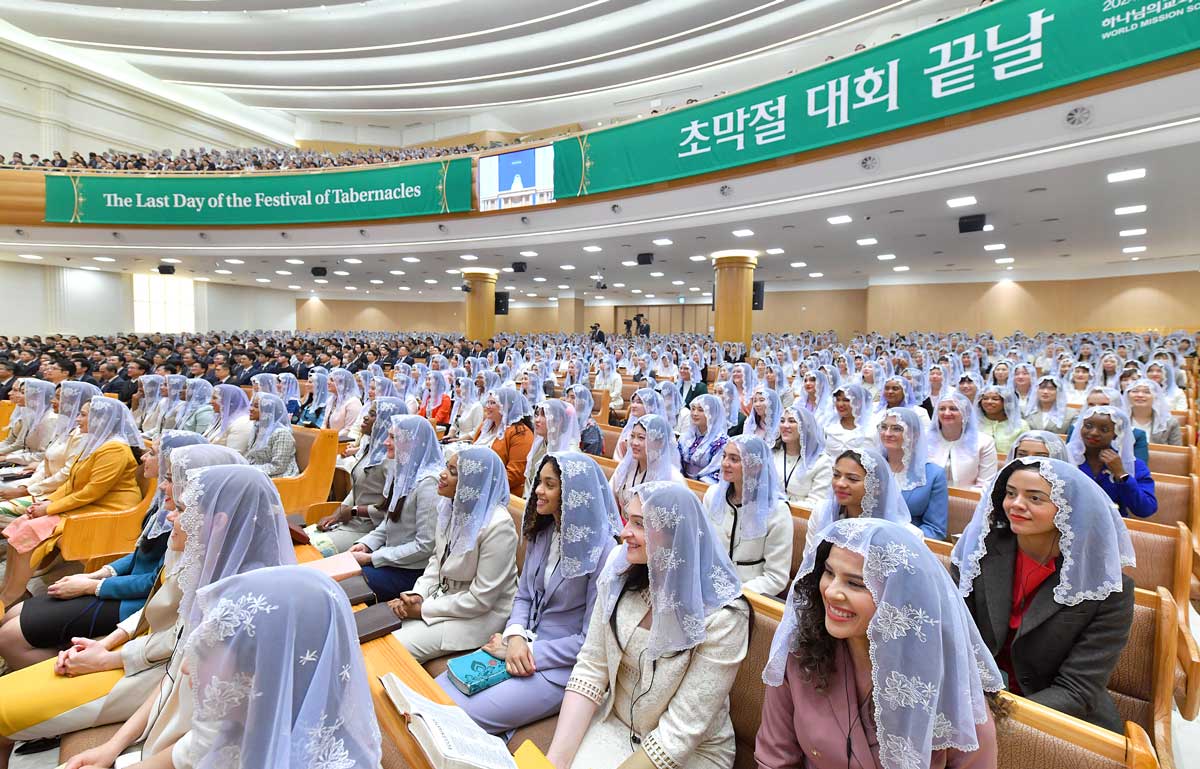Select a Language
The Sacred Assemblies of the Festival of Trumpets, the Day of Atonement, and the Festival of Tabernacles 2024
Give the Gift of Eternal Life to Mankind Through the Power of the Holy Spirit
In 2024, the year marking the 60th anniversary of the establishment of the Church of God, the church members have been diligently spreading the gospel of the new covenant around the world, remembering the love of God who devoted Himself to the salvation of mankind. During the Festival of Tabernacles, which is part of the autumn festivals, members from all over the world attended each worship service with the hope of fulfilling the mission to preach to 8 billion people by the power of the Holy Spirit of the latter rain.
The autumn festivals, which began with the Festival of Trumpets on October 3 and concluded on the last day of the Festival of Tabernacles, October 24, were a blessed time, filled with earnest prayers and preaching.
Festival of Trumpets: True Repentance Accomplished by Reflecting Upon Ourselves
When Jesus was baptized at the age of 30 and began preaching the gospel of the kingdom, the first thing He said was, “Repent” (Mt 4:17). This is because the first step for humans to return to heaven, after being expelled due to sin, is to repent of their sins and correct them—this is repentance.
The Festival of Trumpets calls for repentance before the Day of Atonement. It is the first of the autumn feasts, which are part of the third set of the seven annual festivals, and it has its origin in the work of Moses during the Exodus, just like the first and second sets of festivals. When the Israelites repented with all their hearts after breaking the Ten Commandments by worshiping the golden calf, God granted them the second set of the Ten Commandments as a sign of forgiveness. The Day of Atonement, which falls on the 10th day of the seventh month on the sacred calendar, marks the day when Moses descended from Mount Sinai with the second set of the Ten Commandments. The Festival of Trumpets serves as a day of preparation for the Day of Atonement, with the blowing of trumpets to call for repentance during the ten days leading up to the Day of Atonement (Ex 34:1–29; Lev 23:23–24). In New Testament times, the Prayer Week is observed for ten days, starting from the Festival of Trumpets, with services held early in the morning and in the evening. During this period, members should examine themselves, confess their sins to God, and pray for the forgiveness of their sins.

During the Festival of Trumpets held at the New Jerusalem Pangyo Temple on October 3 (the 1st day of the seventh month according to the sacred calendar), Mother earnestly prayed that the children of Zion would achieve complete repentance through sincere prayer and be reborn as beautiful children in the eyes of God.
General Pastor Kim Joo-cheol emphasized, “Repentance is the main message of the Bible in the Old and New Testaments. Repentance and salvation are closely related. When we remember our duty as spiritual sinners, we can establish our identity as true believers and fully follow all the teachings of God” (Ps 7:10–13; Eze 18:30; Lk 13:2–3; Ac 2:37–38; Mt 28:18–20). He added, “Let us always give thanks to God, remembering the holy sacrifice of God who walked the path of suffering on the cross until we were saved by His precious blood, and blow the trumpet of repentance so that all mankind can return to God” (Ac 26:18–20; Ro 2:5–11; 2 Pe 3:6–9; Joel 2:12–14; 2 Ch 7:12–14).
The members, who engraved God’s words in their hearts, began the prayer week with a contrite heart and sincere supplication, hoping to stand before God with complete repentance.
Day of Atonement: God Is With a Contrite Spirit
The Sacred Assembly of the Day of Atonement took place on October 12 (the 10th day of the seventh month according to the sacred calendar). The Day of Atonement is the festival during which our sins are completely forgiven. Through the ceremonies of the Day of Atonement in the Old Testament, we can understand the process and providence of atonement. The sins of the people, committed during ordinary times were temporarily transferred to the sanctuary through the sacrifice of animals. On the Day of Atonement, the high priest cast lots for two goats. One goat was offered as a sin offering to the LORD, and the other served as the scapegoat. The scapegoat symbolically carried all the people’s sins and was sent into the wilderness. When the scapegoat died while wandering in the desert, the sins it bore were considered destroyed (Lev 16:5–22).

Mother earnestly prayed that all the children around the world, who prayed to repentance every morning and night during the prayer week, would receive the complete forgiveness of sins and become children of love who save souls by putting all their heart, soul, and mind into leading sinners to repentance.
General Pastor Kim Joo-cheol, who explained the meaning of the Day of Atonement said, “The sanctuary that temporarily caries our sins and the sacrifices for atonement represent God, and the scapegoat represents Satan. If we have realized the grace of God who bears and suffers for our sins until our sins are completely passed onto Satan and vanishes, we must never be involved in sin again” (Lev 17:12–14; Jn 1:29; Isa 53:1–6; Eph 1:7; Rev 20:10; Heb 10:4–7, 26–29). He added, “Now that we have received the grace of atonement, let us live a new life, having only God in our hearts, not sin. Let us faithfully carry out God’s will for the salvation and repentance of mankind, which God desires the most, taking it as the biggest command given to us” (Gal 2:20; Php 1:20–21; Lk 19:10; 1 Th 2:3–4).
The Festival of Tabernacles: Adding Love to the Holy Spirit of the Latter Rain
The Festival of Tabernacles is a time of abundance and joy, when generous hearts are shared after the harvest. Its origin is closely tied to the historical event of receiving the second set of the Ten Commandments. When Moses descended from Mount Sinai, he delivered God’s command to build the tabernacle to house the Ten Commandments, and the people willingly gathered materials for its construction. God established the Festival of Tabernacles to remember the Israelites’ dwelling in booths during their journey through the desert. In the Old Testament, people gathered branches to build booths and stayed in them for seven days, sharing in joy. In the New Testament, this period became a time for a preaching festival to gather God’s people, the materials of the spiritual temple (Lev 23:33–43; Ne 8:14–18; Jer 5:14; Eph 2:20–22).

On October 17 (the 15th day of the seventh month according to the sacred calendar), the 80th Overseas Visiting Group participated in the Festival of Tabernacles at the New Jerusalem Pangyo Temple. Members from around the world gathered to celebrate the festival, exchanging warm greetings with joy and anticipation of receiving the blessing of the Holy Spirit.
Mother prayed that the hearts of Her children worldwide, cleansed through observing the Day of Atonement, would be filled with the Holy Spirit of the latter rain. She prayed that they would all become united in love, bear the fruit of the Holy Spirit, and contribute to the fulfillment of world evangelism. Mother also bestowed blessings on the overseas members visiting Korea, encouraging them to become mature gospel workers who glorify God by keeping the festivals with unwavering faith.
General Pastor Kim Joo-cheol stated, “The Festival of Tabernacles reflects God’s will to gather His children, represented by the materials of the temple—that is, our brothers and sisters who have been separated from heaven. As Jesus, our Redeemer, set the example, it is our mission to contribute to the completion of the spiritual temple by preaching diligently” (Jn 7:1–2, 14, 37–39; Mk 1:35–38; Rev 3:11–12). He also highlighted that the apostles who accepted Jesus were transformed and empowered by the Holy Spirit, adding, “God has promised the Holy Spirit of the latter rain to us as well, who have accepted the Spirit and the Bride, our Saviors in this age. Let us fervently pray for the Holy Spirit during the Festival of Tabernacles so that each of us can take a leap of faith and accomplish the gospel work God has planned for us” (Zec 14:16–19; 1 Co 12:4–11, 25–31; Ac 1:8)


During the seven-day preaching festival, the members dedicated themselves to spreading the gospel with the same fervor as the saints of the early Church and joyfully participated in the worship service on the Last Day of the Festival of Tabernacles, observed on October 24 (the 22nd day of the seventh month by the sacred calendar). Two thousand years ago, on the Last Day of the Festival of Tabernacles, Jesus granted the Holy Spirit, symbolized as the water of life. In his morning sermon, General Pastor Kim Joo-cheol explained, “Two thousand years ago, Jesus Christ bestowed the Holy Spirit of the early rain upon His people, and today, the Spirit and the Bride grant us the Holy Spirit of the latter rain. The key to receiving the Holy Spirit is to recognize and accept the Savior of the age.” He further emphasized, “Let us fulfill the mission of preaching the gospel of the kingdom in Samaria and to the ends of the earth, strengthened by the power of the Holy Spirit” (Jn 20:19–23; Eze 47:1–2; Gal 4:26).

Mother proclaimed that the members had received the abundant Holy Spirit on that day, a blessing they had earnestly prayed for over the past ten days. In the afternoon, Mother delivered a sermon titled “Be Joyful Always.” She enlightened the members about the sacrifice of Heavenly Father, who walked the gospel path for 37 days and nights to save the sinners of heaven. She urged Her children to use the gift of the Holy Spirit to save many souls with the same loving heart as Father. Mother reminded the members, saying, “You are truly blessed because you are heading toward the kingdom of heaven, where great rewards await you. God is protecting us, so there is much to be joyful about.” She encouraged them, adding, “Let us always maintain a joyful heart in our life of faith and share the joy of salvation and the blessing of eternal life with all mankind through the power of the Holy Spirit” (1 Th 5:16–18; Php 4:4; Mt 5:8–12; Zep 3:14–20; Ps 91:5–7; Dt 28:1–6).
The members resolved to fulfill Mother’s words with stronger faith. Sister Ayana Oita from Tokyo, Japan, shared, “I have many shortcomings, but since receiving the Holy Spirit during the Feast of Tabernacles, I will boldly preach and participate in the gospel work in Japan.” Brother Kwon Soon-il from Seongnam, Korea, expressed, “To those who are exhausted and struggling in a competitive society, I want to share laughter and the hope of salvation through the Passover by practicing good deeds as Mother has taught us. I hope the sincere heart of God, who wants to gift eternal life, will reach many people.”